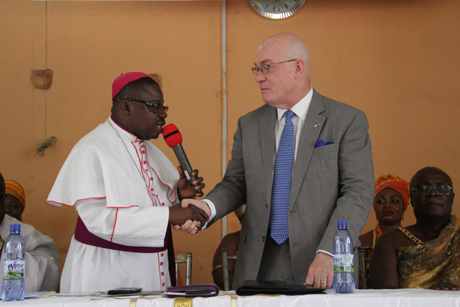[from ACNS, by Gavin Drake]
Modern slavery is a significant issue in the Western African nation of Ghana. It is estimated that over a million youth, representing nearly a quarter of the population under 18 are engaged in the labor force, with 190,000 living in conditions of slavery. To combat this issue the Diocese of Accra has developed a four-part strategy of prevention, release, education and economic empowerment named “Hope Community” that has won the financial support of the United States. Describing the program, Bishop Daniel Torto said; “The child protection aspect will entail a preventive strategy of raising awareness for behavioural change, a curative strategy of rescue, rehabilitation, reintegration and monitoring of victims of child trafficking in Ghana. The education aspect involves providing affordable education for children from deprived families and general educational support to children. Furthermore, the livelihood aspect will focus on sustainable economic empowerment for deprived families as a way of reducing poverty levels, which has been identified as the main underlying factor for child trafficking in Ghana. And finally, the advocacy aspect will focus on influencing national and international policies, laws and programmes that protect children and also push for law enforcement.”
At a launch ceremony to mark the beginning of the five-year effort, US Ambassador Robert Jackson and Bishop Torto spoke.
The US Ambassador to Ghana, Robert Jackson, was in Accra last week for the launch of a five-year project that will culminate in the creation of “Hope Community” – a place where rescued children can “become what they were ordained by God to be.”
Speaking at the launch, Ambassador Jackson acknowledged the role that religious leaders had played in speaking out against “the abhorrent practice of slavery” in the US in the 19th century. “Men and women of faith indicated that their religious beliefs demanded a higher standard of morality,” he said. “By taking a stand against an accepted cultural practice of the time, these religious leaders were part of the successful process that resulted in the abolition of slavery.”
He cited other examples of “faith leaders standing against injustice and providing hope”, including the role played by Archbishop Desmond Tutu in campaigning against Apartheid in South Africa, and the Albanian Muslims who protected Jewish neighbours during World War II because “their faith demanded it.”
The Ambassador made it clear he wasn’t referring to chores or work that develops character, but back-breaking labor done by children being exploited by the wealthy.
We are talking about the children spending their days serving in the houses of wealthier families, while the sons and daughters of that household attend school. This is not building the character and skills of Ghana’s children. It is profiteering off their exploitation.”
The ambassador described the Accra diocesan project as being “critical to dispelling misconceptions of forced child labour”
He added: “I applaud church leaders’ efforts to care for child trafficking victims. Here in Ghana and around the world, you regularly see religious communities at the front lines of victim protection efforts. They are operating the shelters that keep victims safe. They are providing the physical and psychological care needed to heal victims’ trauma. And they are working to reintegrate survivors back into society. . .
“On an issue as vexing and persistent as human trafficking, every person has a role to play. Everyone supporting this campaign will be carrying forward a powerful message of hope to the many children suffering in trafficking situations today.
“I applaud your commitment to this noble cause, and I know that, partnering together, we will make real progress and touch real lives.”
The Bishop of Accra also spoke, adding that the effort to undermine child slavery and human trafficking was not only needed to relieve the suffering of those caught in slavery, but that it was of vital importance to the whole nation to allow every person to be able to live into their potential.
“As a country, we cannot ignore or downplay the existence and pernicious impact of child trafficking on our children who are the future leaders of our nation.
“Destroying their future now through these evil practices is a sure way of obliterating a bright future for this country. It actually undermines our respect for human rights and human dignity as a country. It is the nation’s human capital.”
image: from Diocese of Accra

